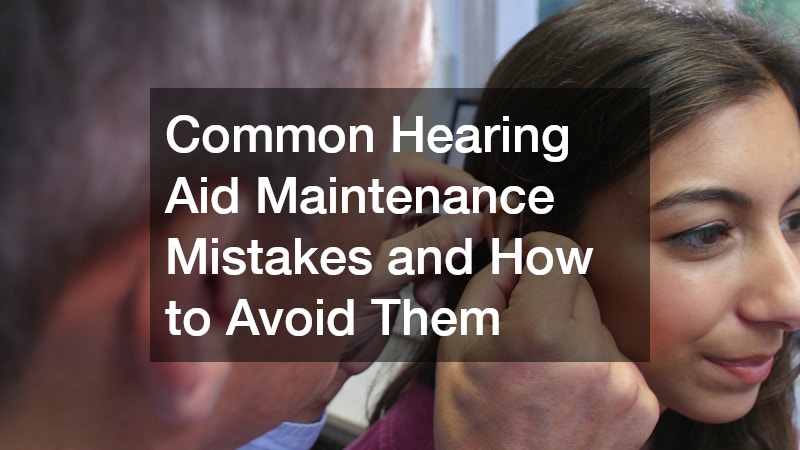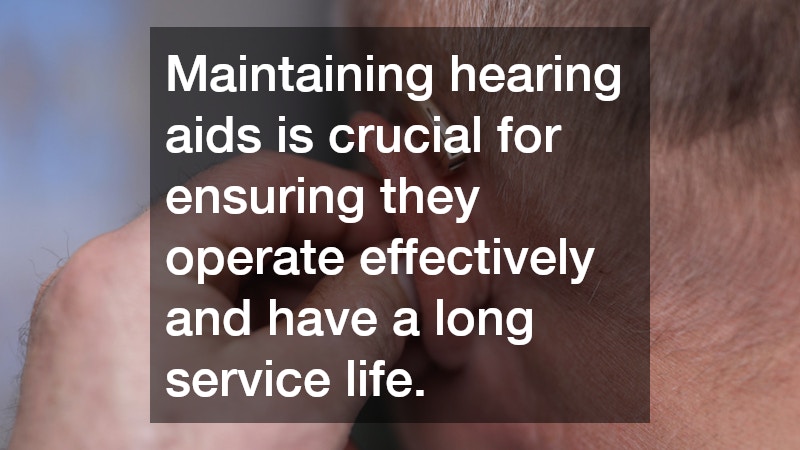
Hearing aids are intricate devices designed to significantly improve the quality of life for those with hearing impairments. However, like any sophisticated technology, they require regular maintenance to function optimally. In this article, we will delve into common hearing aid maintenance mistakes and provide tips on how to avoid them to ensure the longevity and effectiveness of your hearing devices.
Neglecting Regular Cleaning
One of the most frequent hearing aid maintenance mistakes is neglecting regular cleaning. Hearing aids spend a lot of time in close contact with the human body, making them susceptible to earwax, moisture, and dirt buildup.
Ignoring these contaminants can lead to reduced performance and even permanent damage to the device. A simple routine of daily cleaning can go a long way in preserving the functionality of your hearing aids. This involves gentle wiping with a dry cloth and using a specialized brush to clear away wax from small openings.
Using improper tools for cleaning can exacerbate wear and tear on hearing aids. It is advisable to use cleaning tools that are specifically designed for hearing aids, commonly provided by manufacturers or hearing specialists. Metal implements such as paperclips or needles can cause damage to sensitive components inside the device. Over time, such mistakes could lead to unnecessary repairs or replacements. Therefore, investing in the right tools and learning the proper cleaning techniques are crucial for effective hearing aid maintenance.
Additionally, many people overlook cleaning as essential preventive maintenance. Routine cleaning prevents the accumulation of debris that could impede a hearing aid’s performance. This ensures that the sound quality remains consistent and dependable. Prioritizing regular cleaning can mitigate the need for frequent professional servicing. By dedicating a few moments each day to maintain cleanliness, users can significantly extend the life and capability of their devices.
Ignoring Moisture Control
Another common error in hearing aid maintenance is failing to manage moisture exposure. Hearing aids are sensitive to moisture, which can cause malfunctions or complete failure if not properly handled. People often underestimate the impact of sweat, humidity, and accidental splashes. To avoid this issue, users should remove their hearing aids when showering or swimming, and be cautious when using them in rain or during intense physical activity. Storing hearing aids in a dry, cool place or using a dehumidifier specifically designed for these devices can also be beneficial.
Not using dehumidifiers or desiccant pouches as part of regular maintenance can lead to lifespan reduction. These products are designed to extract moisture, protecting the hearing aids from internal corrosion and other moisture-related damages. For individuals living in humid climates or who are particularly active, these tools are indispensable. Regularly utilizing a dehumidifier before bedtime helps maintain the integrity and performance of the hearing aids. This proactive measure ensures long-term cost savings as it reduces the need for repairs or replacements.
Moreover, when devices are subjected to excessive moisture without proper drying, sound quality can significantly deteriorate. Users might experience interrupted sound transmission or decreased amplification as moisture affects internal components. Over time, unchecked moisture can lead to habitual failures of the devices which deteriorates overall user satisfaction. Practicing regular moisture control as part of hearing aid maintenance ensures that optimal sound quality is consistently delivered, enhancing the user’s hearing experience.
Delaying Professional Servicing
Procrastinating professional checks and adjustments is a common oversight when it comes to hearing aid maintenance. Many users assume that if the device seems to be working, there is no need for professional attention. However, regular professional assessments can detect issues that are not apparent to the user. Such evaluations ensure the device is calibrated correctly and is not suffering from hidden internal damage. Hearing specialists can also provide guidance and advice for improved maintenance practices, contributing to the device’s longevity and efficacy.
Regular visits to a hearing specialist should be integrated into one’s maintenance routine. These experts have the necessary equipment and expertise to conduct thorough diagnostics and adjustments. Specialist checks can prevent small issues from escalating into major problems. Moreover, they can provide routine updates to the software in digital devices, ensuring you always have the best auditory experience possible. Establishing a schedule for professional assessments every few months is a sensible aspect of comprehensive hearing aid maintenance.
Maintaining hearing aids is crucial for ensuring they operate effectively and have a long service life. Common mistakes such as neglecting cleaning, ignoring moisture control, and delaying professional servicing can significantly impact the performance and durability of these essential devices. By implementing regular cleaning routines, managing moisture diligently, and scheduling consistent professional check-ups, users can avoid these pitfalls. Adequate hearing aid maintenance not only preserves the devices but also enhances the auditory experience, allowing individuals to continue enjoying the sounds of their world with clarity and confidence.


